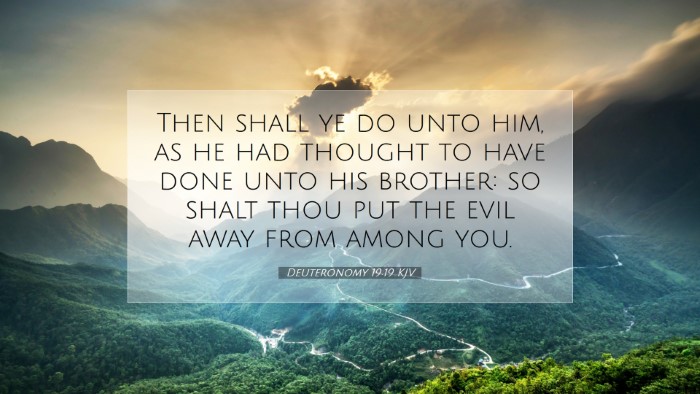Commentary on Deuteronomy 19:19
Bible Verse: "Then you shall do to him as he had intended to do to his brother; so you shall purge the evil from your midst."
Introduction
This verse is situated within the context of laws concerning cities of refuge and the administration of justice in ancient Israel. It emphasizes the importance of fairness, justice, and the divine mandate for the sanctity of life. Public domain commentaries by Matthew Henry, Albert Barnes, and Adam Clarke provide layered insights that can greatly benefit pastors, students, theologians, and Bible scholars.
Contextual Analysis
Deuteronomy 19 discusses the judicial system God established for His people. It illustrates the idea of justice, retribution, and the necessity to maintain communal integrity by punishing wrongdoing within the community. The specific verse serves as a reminder of the consequences of malicious intentions and actions.
Insights from Matthew Henry
Matthew Henry comments extensively on the themes of justice and morality present in Deuteronomy. He emphasizes that this command serves as a deterrent against malevolent intentions:
- Retributive Justice: Henry points out that the punishment fits the crime, ensuring that the consequence corresponds directly to the initial intention of the wrongdoer.
- Purge the Evil: He highlights a vital biblical principle: to remove evil from amongst the people to uphold the purity of the community.
- Impartiality in Judgement: Justice must be administered without partiality, reflecting God's own character of righteousness.
Insights from Albert Barnes
Albert Barnes offers a legal interpretation of the retributive aspect of justice found in this verse. He elaborates on several key points:
- Intent and Outcome: Barnes explains that the Law of Moses emphasizes the significance of one's intentions. Wherein the doer’s intention to harm is directly met with equal severity in their punishment.
- Judicial Authority: He notes that this provision grants the judges responsibility to carry out justice correctly, ensuring the protection of societal order.
- The Role of Fear: The fear of corresponding punishment serves as a preventive measure against wicked acts.
Insights from Adam Clarke
Adam Clarke's commentary draws attention to the spiritual implications of this verse:
- Spiritual Purity: Clarke discusses how purging evil from the community signifies the quest for spiritual cleanliness and integrity among God’s people.
- The Nature of Sin: He emphasizes that sin must be dealt with severely to prevent its spread. The punishment serves both as retribution and as a safeguard for the community.
- Historical Context: Clarke also contextualizes the legal framework of ancient Israel within the broader narrative of God’s covenant with His people, illustrating how these laws were intended to reflect God's holiness.
Theological Implications
This verse carries significant theological weight, underscoring several key principles that resonate throughout Scripture:
- The Importance of Justice: God's call for justice is reflective of His own nature, presenting Him as a just God requiring His people to mirror this attribute.
- Consequences of Actions: The established law inherently teaches accountability; every action bears consequences, a theme that resonates across both the Old and New Testaments.
- Understanding Sin: The text encourages individuals and communities to take sin seriously, highlighting the communal responsibility towards maintaining holiness and righteousness.
Application for Today
The insights drawn from this verse can be profoundly impactful for contemporary believers and leaders:
- Advocating for Justice: Just as ancient Israel was called to uphold justice, modern believers are charged with advocating for righteousness and justice in society.
- Examine Intentions: Pastors and leaders are encouraged to examine the intents behind actions as much as their outcomes, fostering a holistic understanding of righteousness.
- Community Responsibility: The principle of purging evil from the community can be used to emphasize the importance of accountability among church members, encouraging a culture of love, honesty, and integrity.
Conclusion
Deuteronomy 19:19 encapsulates vital attributes of God's character—justice, holiness, and the necessity for community integrity. By synthesizing insights from revered public domain commentators, we are reminded of the ongoing relevance of these ancient principles in our modern context. Understanding the profound implications of this verse equips us to walk in righteousness and embody God's justice within our communities.


